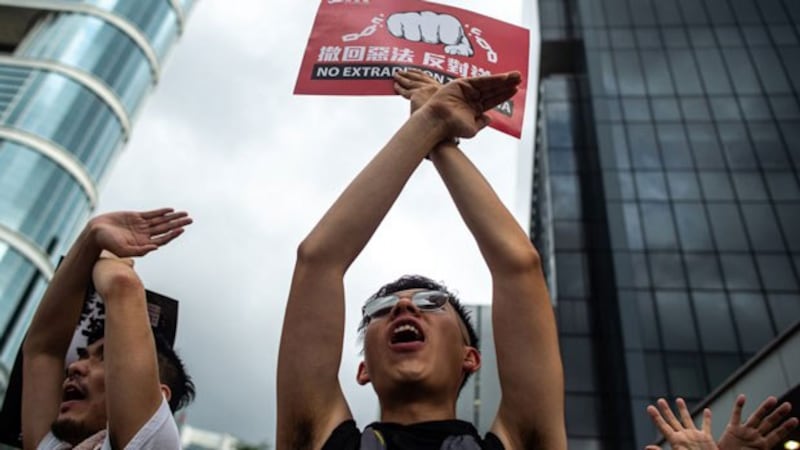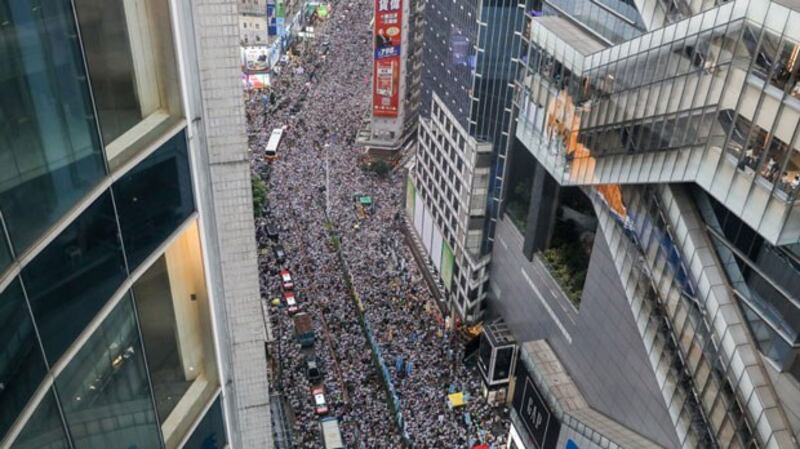UPDATED at 2:15 P.M. EDT on 2019-06-09
Police fired pepper spray on several hundred protesters who gathered in Hong Kong at the tail end of a million-strong protest on Sunday against plans to allow the rendition of alleged criminal suspects to mainland China.
Riot police were called in after several hundred protesters besieged the city's legislature at the end of the march, which had otherwise gone peacefully, government broadcaster RTHK reported in the early hours of Monday, local time.
It said protesters who heeded a call to besiege the Legislative Council (LegCo) ended up in violent clashes with the police shortly after midnight, with officers repeatedly firing pepper spray and hitting demonstrators with batons.
The protesters blocked a street, ramming police officers with metal barriers and threw bottles at them during chaotic scenes, RTHK said, adding that a number of journalists were also injured in the melee.
The police warned protesters that all their gatherings were illegal, it said.
As an estimated 1.03 million people took to the streets of Hong Kong in a massive outpouring of public anger, the city's government reiterated its determination to get the proposed amendments to the extradition law through the legislature.
Shouting "Withdraw the evil law!" and "Oppose renditions to China!" protesters -- many of whom were wearing white to represent "light and justice" -- continued to crowd onto the city's streets after the march left Victoria Park, swelling the ranks of the demonstration in spite of police attempts to impose crowd controls at key subway stations along the route.
The number of passengers alighting at Tin Hau, North Point, Causeway Bay and Tsimshatsui stations were subject to police controls, with some trains ordered not to stop at Tin Hau at all.
A protester surnamed Wong who said he had just graduated high school said the planned amendments to the Fugitive Offenders' Ordinance would pose a huge threat to Hong Kong's way of life, which was supposed to have been protected under the "one country, two systems" framework under which the former British colony was handed back to China in 1997.
"I'm a Hong Konger born and bred, and I would have come on this march with my last breath, to speak out for Hong Kong," Wong told RFA. "The [proposed amendments to the] Fugitive Offenders Ordinance pose such a threat to Hong Kong."
"If passed, this law will have a huge impact on Hong Kong."
Yellow umbrellas
Marchers waved placards saying "No China Extradition!", while many in the crowd carried yellow umbrellas reminiscent of the 2014 democracy movement bearing the words: "Keep hold of freedom: oppose the evil law!"
"There are so many people here," eyewitness Wang Yan told RFA.
"They're on the sidewalks, on the overhead bridges. It's so packed that we can't move."
"I've been coming to demonstrations for many years now, and this is the biggest one I've seen."
A fellow protester surnamed Ho said he had brought his daughter on the march.
"This government won't listen to reason, so we'll have to make them listen to reason, and undergo consultation, and do this properly," Ho said. "They shouldn't railroad this law through [the legislature]."
"I need to know exactly why they want to amend this law: matters that have a huge impact on everyone shouldn't be decided on the say-so of one or two individuals," he said.
A protester surnamed Lee said the amendments, once implemented, will offer the ruling Chinese Communist Party a range of excuses to take Hong Kong residents across the border to face trial.
The government's planned legal amendment—which the ruling Chinese Communist Party wants implemented "urgently"—has sparked widespread fear that the city will lose its status as a separate legal jurisdiction, and that rights activists and dissidents in the city could be targeted by Beijing for actions deemed illegal across the internal border.
Judges, lawyers, opposition politicians, rights activists, business groups, and journalists have all expressed vocal opposition to the plan, which will allow China to request the extradition of an alleged suspect from Hong Kong based on the standards of evidence that currently apply in its own courts.

Legal safeguards doubted
The most likely jurisdiction to use the proposed provision is mainland China, which currently has no formal extradition treaty with Hong Kong, and Lam has tried to reassure people that legal safeguards will be used to safeguard the rights of suspects.
But lawyers say said the government's supposed safeguards are meaningless, and said they had staged a silent protest in a bid to get more people out onto the streets for Sunday's march.
Some protesters faced off with police on Sunday after the authorities refused to open up more traffic lanes to accommodate the demonstration.
"According to the notice of no objection to this protest issued by police, you are obliged to use the sidewalk, the westbound traffic lane and the east-west tram line for the march," a police officer told protesters.
However, a number of protesters leaped over the barrier, blocking oncoming traffic at Causeway Bay, which had no way to move in any direction.
By the time the march arrived outside Hong Kong's Legislative Council at around 4.00 p.m. local time, police had opened up all lanes of traffic along its route to protesters.
Seven people were arrested during the protest, one of them for assaulted a police officer, a police spokesman said on Sunday, calling on demonstrators to leave the area as soon as the march was over.
"The police would like to call on all protesters to leave the area in a peaceful and orderly manner after arriving at government headquarters," the spokesman said.
The Hong Kong government recognized the right of protesters to express their views, but refused to change the planned passage of the bill through LegCo.
"As a free, open and pluralistic society, we acknowledge and respect that people have different views on a wide range of issues," the government said in an official statement on the march.
"We note that apart from some obstructions to traffic, the march, though large, was generally peaceful and orderly," it said, but repeated its insistence that there are adequate safeguards built into the amendments to prevent politically motivated extraditions to mainland China.
Trumped-up charges feared
Citing its inability to extradite a Taiwanese man suspected of murdering his girlfriend owing to a lack of discretionary power covering jurisdictions not covered by formal extradition treaties, the government said the amendments were aimed at preventing Hong Kong from becoming a "bolt-hole" for criminals.
"None of these serious criminal offences [covered by the renditions bill] relate to the freedom of assembly, of the press, of speech, of academic freedom or publication," the statement said. "And no surrender for a political offence or if the purported charges are in fact on account of race, religion, nationality or political opinions."
But journalists and rights activists say they could just as easily be extradited on a trumped-up charge, should the ruling Chinese Communist Party decide it wanted to retaliate against someone in Hong Kong, whether living there or simply visiting.
The Hong Kong Journalists' Association (HKJA) has warned that journalists have already been targeted for political reasons in China, using "baseless allegations ... including possession of drugs, smuggling, bribery and fraud."
Under the planned amendments to the Fugitive Offenders Ordinance, China would be able to request the extradition of an alleged suspect based on the standards of evidence that currently apply in its own courts, the HKJA said in a statement earlier this month.
"We urge the Legislative Council to scrutinise the Bill in a calm, reasonable and respectful manner to help ensure Hong Kong remains a safe city for residents and business," the government said.
"The Second Reading debate on the Bill will resume on June 12," it said, indicating that it will stick to its original intention of passing the amendments ahead of the summer recess.
Claudia Mo, who convenes the pan-democratic camp of lawmakers in LegCo, said chief executive Carrie Lam is pushing the bill through at Beijing's behest.
"Beijing has become increasingly impatient with Hong Kong since our umbrella movement five years ago," she said. "[The Chinese leadership] sees us as an unruly teenager who doesn't learn to be grateful and obedient."
"The idea is to - ultimately - disappear Hong Kong, or at least to change it into one of the numerous Chinese cities," Mo told RTHK on Sunday. "Like a little boat, Hong Kong is sinking fast, but we're not taking this lying down, we have to put up a fight," she said.
In Washington, a State Department spokesman said the U.S. is following developments in Hong Kong very closely, and that the proposed amendments were indicative of a "serious erosion" of the city's traditional rights and freedoms, as promised under the terms of the handover.
They would also affect Hong Kong's international standing as a free port and separate jurisdiction from mainland China, the spokesman said.
Republican Senator Marco Rubio said he is also extremely concerned over the extradition plans. In a statement, he said. Rubio vowed to table the Hong Kong Human Rights and Democracy Bill in Congress, which would require a review of Hong Kong's status as a separate trading jurisdiction.

Reported by Wong Lok-to for RFA's Cantonese Service, and by Qiao Long for the Mandarin Service. Translated and edited by Luisetta Mudie.
